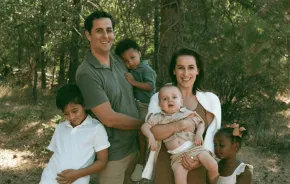
One of the things that can be hardest about watching our children grow into adolescence and young adulthood is dealing with our own hopes and fears about their sexuality. Will they make choices that are consistent with the values we tried to teach them? Will they be safe? Will they get involved with caring people who treat them with the respect they deserve? What if they get hurt?
As a counselor at Hillel UW, I often have the opportunity to talk with young people about their sexual lives. I can tell you this: Young adults have a wide range of experiences as they begin to explore their sexuality, and it is complicated. Many are struggling to understand and express their own desires. Many are learning how to ask for the things they want and say no to the things they don’t, and sometimes it goes well, and sometimes it doesn’t. Many are learning to navigate the intense and complex emotions of jealousy, desire, insecurity and heartbreak.
Some are learning how to regulate their alcohol use at the very same time that they explore their sexuality, and the results of that combination are complex and often messy. Some have parents or other safe adults they can talk with; some don’t. Some are not being sexual with others, by choice or not by choice, and have complex feelings about this. Some are engaging in relationships and behaviors they fear their parents would not understand or approve of, and they keep their choices to themselves. Some are having wonderful experiences; some are having OK experiences that they learn from; and, some are having painful experiences that hurt them in a deep way.
As parents, there are foundational skills that we can begin to build, in a developmentally appropriate way, very early in our children’s lives.
1. Teach your children about the importance of consent
It is important for children to learn that they have the right to decide what they will and will not do with their own bodies and that other people have this right also. Of course, there are some things that are not optional, and families will differ on where they draw this line. For example, we may set limits in our homes that medicine, homework, chores, caring for pets, and maintaining basic hygiene are not things that kids have the option to decline.
We can, however, teach them early on that they are not required to accept hugs, kisses or tickles they do not want. One approach is to offer options: “Grandma is leaving. Would you like to give her a hug, a high-five, a fist-bump, or a wave?” We can also teach children to check in with others and make sure that they have their friends’ consent. This will be an essential practice for healthy relationships later on. For example, “You are all chasing Micah. Is he OK with that? Let’s make sure that he is enjoying being chased. If he’s not ok with it, we’ll need to stop." This excellent article is full of ideas for teaching kids consent throughout their development.
Our bodies tell us when we feel safe, happy, engaged or curious — and they also tell us when we feel threatened, uncomfortable or scared.
2. Teach your children to listen to their bodies and to their instincts
The best way for a person to know what they do and do not want in their sexual relationships is to listen to themselves. Our bodies tell us when we feel safe, happy, engaged or curious — and they also tell us when we feel threatened, uncomfortable or scared. Unfortunately, we are often taught to silence these cues in favor of being polite and easy-going, and this can make it harder for young adults to know what they do and do not want.
From very early on in their lives, we can teach our children to listen for their own responses. You can do this by narrating your own responses and asking about theirs. For example, “Those people seemed very angry with each other. They were really yelling. How did you feel when we were near them? I felt uncomfortable and a little unsafe, which is why I crossed the street with you. What was it like for you?”
3. Demonstrate healthy boundaries — even if it is hard
We hope that our children will have the skill and confidence to maintain their boundaries sexually, to assert what they want and to say no to the things that they don’t want. In reality, though, it can be difficult to say no to people that we like and care about, to feel like we are letting someone down or to acknowledge that we don’t want the same things. We may feel that we need to do whatever it takes to maintain peace in our relationships, even if this means doing things that we deeply do not want to do. Teach your children that it is ok to say no to people you love and care about, and that it is a normal part of relationships that we disappoint and disagree with each other sometimes.
Most importantly, model this behavior. Allow them to see you set boundaries with people you love, and explain what you are doing. “Aunt Susan wanted us to go on a bike ride, but we didn’t have a helmet for you. I didn’t feel comfortable with that, so I said no. I think she was disappointed, but I had to do what felt safe to me.” “Did you notice that I took a step back when we were talking with our neighbor? I felt uncomfortable with how close he was standing. I could see that he was very sad about his dog and wanted to stand very close together, but I had to listen to my own body.”
4. Share your values around sexuality — but also let them know you will support and love them if they don’t adhere to these values
For some parents, it is a core value that sexuality should be reserved for marriage. Other parents feel that sexuality can have a place in any committed, monogamous relationship — and may even hope that their children will have serious relationships and some opportunity to explore their sexuality before they settle down. Still others feel that sex is appropriate and acceptable in a range of relationships, including casual hook-ups, as long as certain standards of mutual respect and safety are met. As your child learns about sexuality, be transparent about the values you hope to teach — but also let them know that you will love and respect them if they choose differently. This lets them know that they can turn to you, even if their choices are not what you had hoped.
5. Get support for yourself
Sexuality can be a loaded topic for many of us. Watching our children grow into their own sexuality can be challenging, and talking with them about sex is not always easy. Robie Harris has a wonderful series of kids’ books that can provide a helpful springboard for conversations with children. Amy Lang, a local sex educator, has books for both kids and parents that may be useful. Make sure you get the support you need by talking with friends and other parents.
Researchers estimate that 17 percent of women 3 percent of men are sexually assaulted during their lifetime. This means that many of us who are parenting have actually experienced some form of sexual violence or violation ourselves. It is very normal for these memories, and the range of emotions that go with them, to come to the surface when our children reach the age or developmental stage we were at when we were harmed. This can be a time of tremendous healing for parents who are survivors of sexual violence, but it is important to get support. This helps us to sort out our own history from what our children are actually experiencing and allows us to be more fully present.











